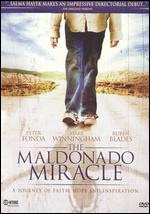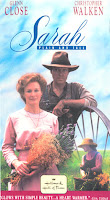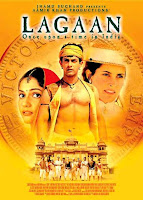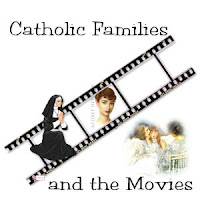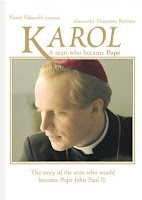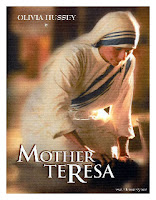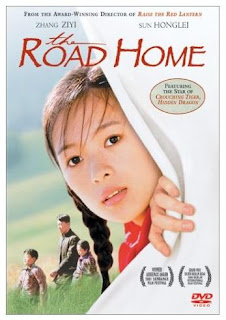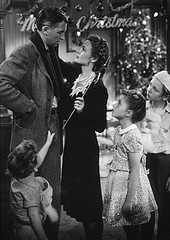This is a wonderful film for this time of year...though more suited to Easter. :) I first saw this film in a Christ figures in film class and thought you might prefer my notes to a more general review. My notes aren't anything more than that...my interpretation of what was intended. That said, Gabriel Axel certainly intended to make a religious film, and Babette is definitely a Christ figure. In fact, there's a boatload of imagery I missed. :)
Notes:
1. We are told at the outset of the film that this particular sect of Protestantism follows Martin Luther. I found that statement a little odd given that it was followed by the assertion that the congregation were to spend all their time on good works. We watch as the sisters serve meals to others, in simple pots, with possibly even simpler contents. Everything about these people is austere. We cannot fail to understand that the goods and pleasures of this life are to be studiously avoided as the focus is on the soul and life eternal. The father keeps his daughters on a very tight leash. Men are discouraged, ever so gently, from seeking their hands in marriage, and both daughters reject suitors that make them “afraid of their joy”. It is as if joy were reflective of excess. Several times we hear little phrases that perpetuate the teaching of the pastor, which at times appears to carry more weight than the teachings of Christ. It is not as though the teachings differ from Christ’s teaching; what is surprising is that we are told to remember what the pastor taught us, rather than what Christ taught us. For example, “Little children, love one another,” and “The only thing we can take into this next life is what we give.” Again, I was confused by the emphasis on works. We do hear that Christ “loved us and cleansed us with His blood,” and services focus on singing and preaching which would be more in keeping with the teachings and practices of Martin Luther. However, you get the sense that through the denial of physical pleasures, as well as the focus on performing good works, the members hope to earn their salvation. This is why they are so disturbed by Babette’s feast; they fear intemperance, and so vow that it will be “as if we had no sense of taste.”
2. A soldier comes to Jutland and falls in love with Martina. When he asks for her hand in marriage the father replies, “My daughters are my right and left hand in serving the Lord. How can you take either my right or left hand from me?” Martina is dutiful, and meekly forgoes this earthly happiness to serve the Lord at her father’s side.
A visiting opera singer is smitten by Philippa. He is struck by her beauty, and delighted by her voice. Sensing that courting this girl might be difficult, he approaches the father and offers to train Philippa’s voice that “she might sing like an angel. That’s important when one sings to God.” Lesson follows upon lesson, and the two are swept up by their feelings when singing together. Philippa is confused by her feelings and obviously uncomfortable, singing “I’m afraid of our joy.” Papin seals his own fate when he assures her that she can be a great diva in Paris. “Emperors and seamstresses will come to hear you sing!” He adds that her voice will bring comfort to the poor, but it is too late; she has seen ambition and runs from it. Her one ambition will be to serve the Lord by her father’s side. She will not be taken in by vanities.
There do seem to be regrets, but I got the sense that these were seen in the light of a good foregone for a much greater good. Again, earthly pleasures distract from the aim, a heavenly Jerusalem. It is no great loss in light of the eternal reward.
3. When we meet Babette, we are told that she was “poor among the poor.” She asks to be allowed to serve the sisters. These are our first clues that Babette is a Christ figure. Shortly after we meet Babette, we watch as she attentively listens to the sisters instructing her in cooking. They prepare a meal which, while nourishing, is neither pleasant to behold nor to eat. This sequence is reminiscent of Christ’s hidden life. Just as Christ, all knowing, allowed himself to be taught, so too, Babette, a gourmet chef, humbly allows herself to be instructed in the “art” of cooking. Christ, the Master, meekly obeyed His parents; Babette, a master cook, meekly obeys the instructions she is given. She adopts the style and customs of the people around her. We begin to see her salvific effect on God’s people in the spirit of joy that buds after her arrival. As she interacts with merchants, there is a kind of friendly haggling. She leaves with her prize goods, and the merchant watches her go, a smile playing about his lips. The next customer is immediately told that she won’t be able to work the same wonders; she is not Babette. The fact that she is a gourmet chef rather than a widow with a knack for cooking helps establish her as a Christ figure. She is a ‘Master’. She has a God-given gift, which she does not “hide under a bushel basket”. And yet, she does not use this gift until the people of God are ready to receive it.
4. When Babette asks to be allowed to prepare a meal for the anniversary of the Founder’s death, she also asks to be allowed some time off in order to prepare. She requires three days. She prepares for the feast in a snow-white apron with a crucifix prominently displayed. This is our signal that Babette’s hidden life is past; she is the Savior preparing for His salvific act. Just as Christ’s sacrifice was not complete until after the Resurrection, a period of three days, so Babette’s sacrificial meal requires three days preparation before its salvific effects can be felt.
That the ‘people of God’ require salvation is clear. Their numbers have dwindled, the members are old, and the spirit of the group is ugly. Grudges formed long ago have festered and deepened with time, and members lash out at each other even as they are supposed to be at prayer. The daughters attempt to lead them, but we see it is futile. Right after the prayer has been spoken, the members are at it again. The community is divided by sin, and the memory of their ‘father’ is distant and dim; they need a savior.
Babette wins the lottery, and it is assumed that she will now return to Paris. She walks along the beach, considering what she will do. We see a white bird fly across the heavens, and at first I thought it might actually be a dove. It was a seagull, but I think it was meant to signify a dove. (A dove on the Jutland coast would have been inappropriate, and a little obvious.) In any case, Babette is inspired. She will serve the community a real meal, a French feast.
The first hint we have that this meal is special is when we hear that the General joining them for the feast will make their number 12, an obvious reference to the Last Supper. That the General, an outsider to the community, is welcome is a nice touch, given that salvation is not for the Chosen People only. Even the coachman and serving boy partake, although not at the table, which is interesting for several reasons. These three represent outsiders; they are not the Chosen People. They are, however, the only ones who appear to appreciate the sacrifice! By contrast, the Chosen People turn away from the gift; they will eat, but they will not enjoy. It will be as if they did not have a sense of taste. Also, Babette does not eat. She does taste various dishes to be certain they are properly seasoned, but she does not eat the meal. She is the savior, and hence, does not require salvation. Lastly, the coachman and serving boy are content with the “scraps that fall from the master’s table”, even though they are in this case, hardly scraps.
That the meal has salvific effects is not immediately apparent. The members are true to their word; they manfully resist the sensual pleasures. One of them asserts that “As at the wedding feast at Cana, the food is of no importance.” Again, I had to chuckle. The film, at times, seemed to poke fun at Fundamentalism. These people are so eager to get it right, meticulous in their adherence to the principles set out by their founder. Somewhere along the line, these principles seem to have gotten muddled. Who, having read the account of the wedding at Cana, could cite that example to support the notion that is served is of no importance? In the end, no one can remain unaffected by the loving sacrifice of Babette. The members slowly begin to appreciate the gift of food, and by the end of the meal are choosing to enjoy wine rather than water. Fingers are licked, that every last morsel might be enjoyed. The food itself transforms these people. Through Babette’s sacrificial meal, God’s grace brings peace, joy, and salvation. The members gather about the fountain, singing and dancing, rejoicing in their new-found Faith, and praising God as they declare “Hallelujah!” That they dance about a fountain is no accident; they have been ‘born again’, and the cleansing waters signify their rebirth. The two sisters come to realize the full extent of Babette’s sacrifice only after the meal has been served. She has sacrificed everything, and the sisters feel the joy of her love. They thank her for the meal and praise it; they have been won over and rejoice in their conversion.
5. This film tells the story of God’s Chosen People. We meet them as they live under the Old Law. In Babette, we experience the Savior. She brings joy and peace, dispels fear and awakens a true spirit of charity. She establishes a New Covenant with the People of God through her great, sacrificial act. It is significant that the reason for feasting is the anniversary of the founder’s death. This grounds us in the Old Law, while at the same time transcending it, giving the members new hope, joy, and peace.
6. The film was beautiful. The director made such effective use of lighting and colors that the warmth and depth of Babette’s love was itself almost palatable. By contrast, the scenes with the sisters and pastor made one want to sit up a little straighter to avoid the disapproving glances that might otherwise be cast your way. Contrary to the intention of the film, I was left feeling sad. The tremendous sacrifice of Babette went so long unappreciated. It was, in fact, actively resisted. If that isn’t more telling of the human condition, I don’t know what is. Christ has given us every means, every aid. How many of us truly take part in the Eucharist? Christ offers Himself to us every day; how often do we embrace Him? We do so very little to dispose ourselves to receive His grace. Christ’s sacrifice, the love of the cross, is daily rejected.
God bless, Maria
 Joyeux Noel is a foreign film (filmed in at least three languages - English, French and German) based on the true story of the Christmas Eve Truce of 1914. This is not a children's movie at all, but I thought I'd share it here as it has some incredibly beautiful scenes which could be shared with your family at Christmas.
Joyeux Noel is a foreign film (filmed in at least three languages - English, French and German) based on the true story of the Christmas Eve Truce of 1914. This is not a children's movie at all, but I thought I'd share it here as it has some incredibly beautiful scenes which could be shared with your family at Christmas.



